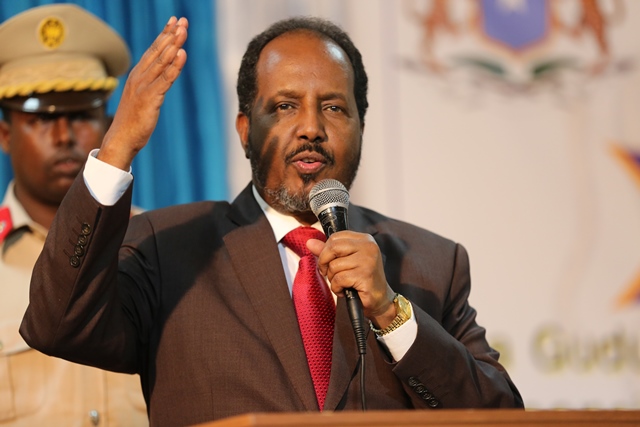Somali president says rebel attacks don’t mean resurgence

Somalia’s President Hassan Sheikh Mohamud has dismissed the capture of settlements by al Shabaab militants this month, saying they had no strategic value and it did not signal a resurgence of the Islamist group.
Al Shabaab, which wants to topple Mohamud and his Western-backed government, retook the central Somali town of Buqda and two other southern settlements this month and has attacked African troops.
The raids follow a military campaign by the African Union’s AMISOM forces and Somali troops that pushed the rebels out of towns on the coast and drove them into increasingly small pockets of countryside mostly in the south of Somalia.
“AMISOM and Somali National Army have liberated most of the major towns in Somalia and have taken over the strategic locations,” Mohamud told Reuters in an interview in the capital Mogadishu. “In the remote areas, al Shabaab may move around to take over some smaller towns, but these are not strategic.”
He said the group that had once ruled much of Somalia, now had limited had access to the sea, which experts said had been used in the past to generate cash for the group from smuggling or importing arms. Al Shabaab controls the Haradheere port town in central Somalia but it lost control of Kismayu port in 2012. “Al Shabaab is not regaining strength at all. It lost everything that could give it strength.”
Western diplomats say the group is being slowly weakened, but can still pack a punch and threaten the pace of Somalia’s gradual reconstruction and state-building process. Just on Thursday, a blast claimed by al Shabaab killed at least three soldiers who were waiting to collect their salaries at a military camp in Kismayu. As well as attacking troops, the group frequently carries out bombings and gun attacks on officials at bureaus, hotels or restaurants.
The president said Somalia was looking to encourage more investment by reforming legislation. Most private investment from abroad has so far come from expatriate Somalis returning. “Somalia will attract direct foreign investment in the near future.
We have been preparing the legal framework that makes this happen,” he said. He did not elaborate the exact measures but said that agriculture, fishing and oil and gas development were potential areas for attracting more investments.
Reuters